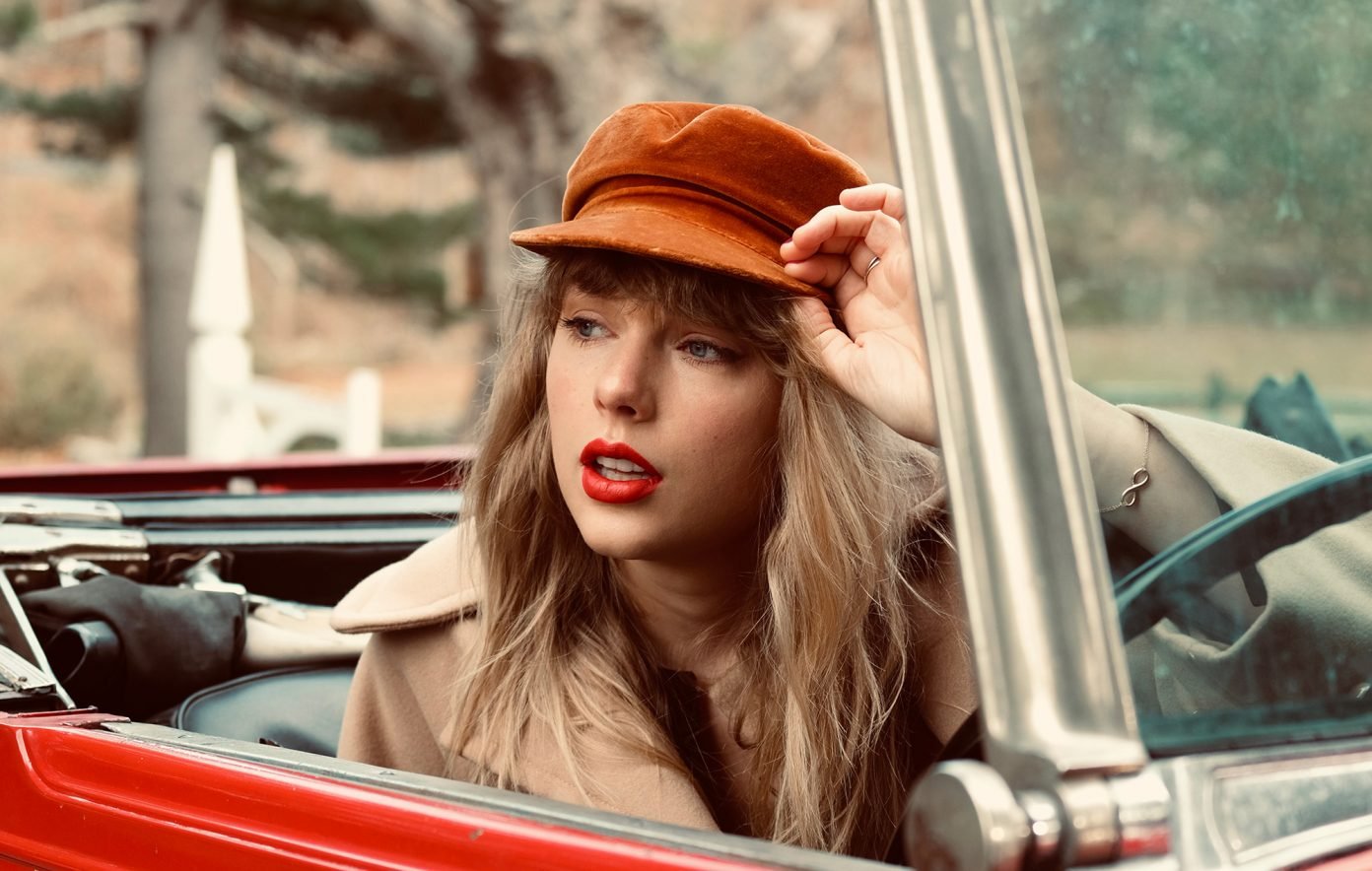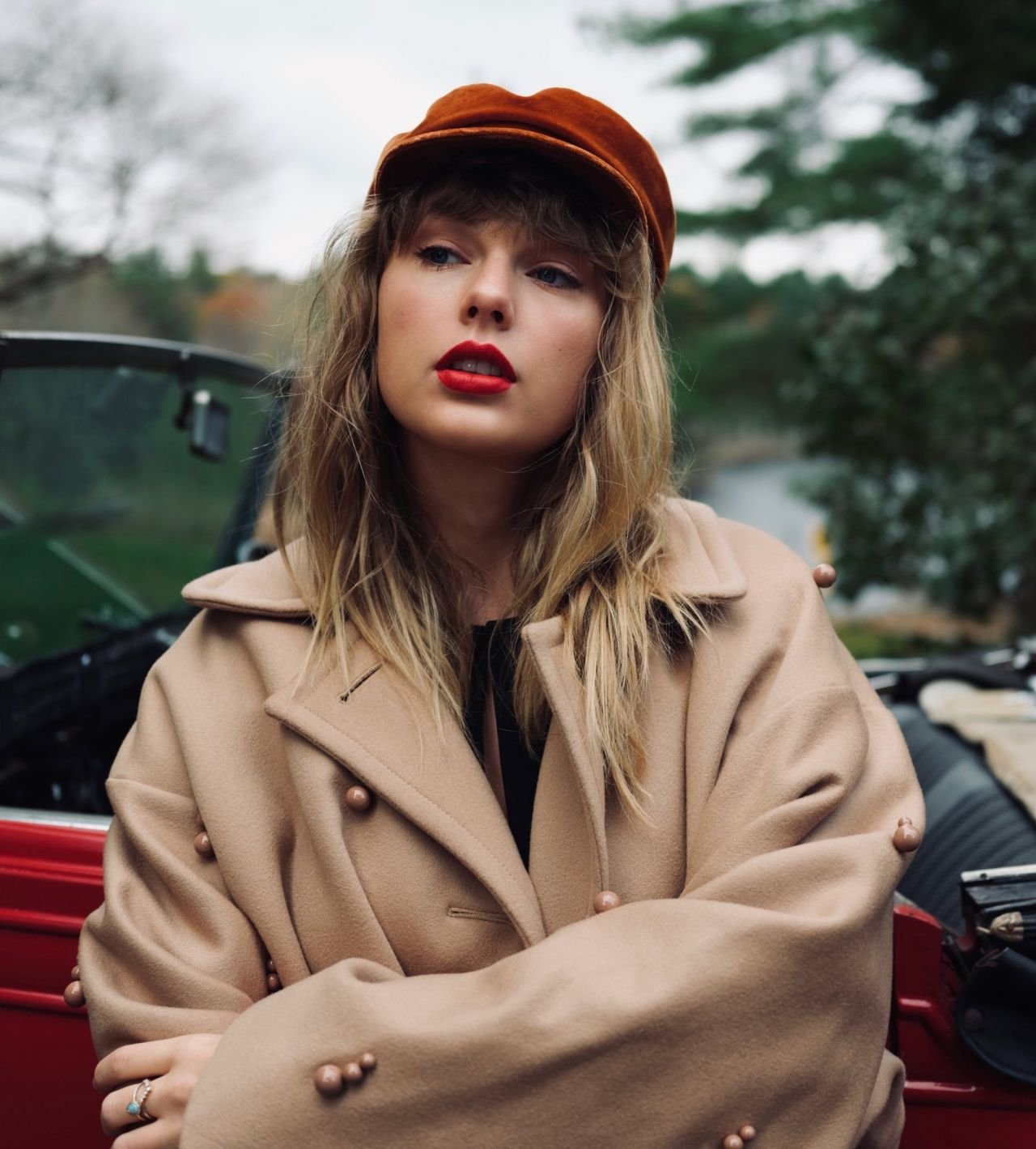Album Review: Taylor Swift Burns and Bleeds on ‘Red (Taylor’s Version)’
Swift returns to her 2012 pop-rock-country crossover with a few years of critical success and a complete 180 in the public eye under her belt. It’s a detailed and faithful re-recording, which brings new light to the relationships that inspired the original.
Written by Felix Kalvesmaki
Photos courtesy of Beth Garrabrant
The past few years have been vindicating for Taylor Swift. Media scrutiny regarding her dating choices and Kanye West feuds dwindles daily. Pitchfork finally started taking her seriously in 2019, uploading reviews of all of her past records that the publication had previously ignored for (probably pretentious) reasons unknown. Her 2020 surprise releases folklore and evermore cemented her status as a singular songwriter and fleshed out her sound with indie stylings and a return to country, while scoring her some of the most laudatory reviews in her career. If an artist is going to undergo the strenuous and, frankly, tedious task of revising every song they’ve put on an album in the first decade of their career, she’s managed a stroke of good fortune that makes this a viable option.
Of course, Swift’s re-records are a way for her to make money off of these first six albums without owning the master recordings of the originals. After her old manager Scott Borchetta alongside music industry boogeyman Scooter Braun snatched the rug out from under her by denying her the chance to own her back catalogue, Swift found herself without ownership of the works that made her famous. But her calculated rereleases, complete with new music videos starring a network of A-list celebrities, album-inspired merchandise in her store, and social media buzz make them feel almost strategic — and successful for her. Post-#MeToo, it’s become reflex to view the stories of forlorn betrayal Swift is known for with more sympathy — the blame now tends to shift to the men. A world more considerate of young women’s feelings meets Swift with understanding as opposed to the loathing and condescension her breakup ballads inspired for years. The likes of Tina Fey and Amy Poehler — women who support other women, girlbosses flying oh so close to the sun — made jokes about her relationships, at her expense. Obviously they weren’t the only ones to do so, which is funny, because it reads like this: “I am listening to a 19 or 20-year-old lament how her boyfriend treated her poorly, and I’ve found a reason to laugh.” In 2021, pithy misogyny still pops up, but it’s easier to Whack-a-Mole. The prevailing conversation is less about what Swift could’ve done wrong, or why she might be blowing things out of proportion, and more about how someone her age didn’t deserve lackadaisical malice from men a decade older than her.
But contrary to popular belief, sometimes Taylor Swift isn’t being treated poorly. On the original Red, and in different ways on Red (Taylor’s Version), we find Swift quite literally happy, free, confused, lonely. She laments over the hurt she’s living through, yes, but lyrically licking her wounds shouldn’t inspire this idea that she’s a perpetual victim. But on the subject of Swift’s romantic autopsies, such as “All Too Well,” the frustrating thing about discussing Taylor Swift with cynicism is the myopia that comes with it: the assumption she can’t get over it, the assumption she’s exaggerating, the assumption she’s the common denominator. Up until maybe 2019’s Lover, each release swirled with gossip over which ex each single traced back to, and vicious criticism about the vindictive, exploitative nature of her songwriting. Other artists, particularly women musicians, experience similar sorts of criticism. Taylor Swift, though, had the first 10 years of her career and then some defined by this misogynistic gossip.
But all of this is attached to the supposed “real-world” timeline of it all: the relationship with an older actor at its centerpiece and the flings that bookended it. It’s not worth playing conspiracy theorist and attaching these stories to certain exes of hers, however public the relationship and the breakup. That feels in poor taste, antithetical to the opportunity we get here to explore the deeper underlying theme of the album. In reliving Swift’s older works collectively at a much different time in culture and politics and their intersection, we can read this record a lot differently.
In 2012, Swift’s career and very public relationships inspired snark from an overwhelmingly misogynistic public. Misogyny, as you’ll note, still exists, but for those of us willing to hear her out the second time around, the album shouldn’t be read as a commentary on a celebrity relationship. Instead, Red (Taylor’s Version) should read as the exploration of a psyche: the world from the perspective of a college-age girl trying to straighten herself out.
Before digging deep into Swift’s songwriting, which remains the meat of the LP in 2021, it’s worth exploring how it sounds. In comparison to Red (2012), there are a few sonic differences in (Taylor’s Version). The guitars across the original tracklist feel brighter and shinier, particularly the acoustics. The drums, especially the electronic ones like the kicks, thud deeper and command the low-end with a stronger pulse. Swift’s vocal performances overall improve, though there are notable exceptions: the beginning of “State of Grace” could come with more power, the infamous “Oh! Oh!”s and “trouble, trouble, trouble”s that follow in “I Know You Were Trouble” are surprisingly less incisive despite her obviously stronger voice. Oh, also, there’s a few of the “we-ee!” vocals on “We Are Never Ever Getting Back Together” which feel like nails dragging along the skull. However, what was truly sonically good about the original is still good about this record. Some songs, such as “Treacherous” and “Stay Stay Stay” even sound the slightest bit fresher. She obviously put more effort into some (hi, “All Too Well!”) than others, but it’s all around a sound recreation that should satisfy listeners and pull the majority of streams away from the originals.
There’s also an interesting refresh here: “Girl At Home” in particular is closer to Charli XCX in 2012 as far as production style than anything Swift had ever done, completely ditching the driving rock pulse of the original. Hell, it hardly sounds like anything Swift has done outside of remixes up until this point. It’s dance-ready synth pop that Red barely brushes shoulders with, and never originally embraced this tightly. None of the other re-recorded songs even approach this sort of switch-up, and considering the intention is to draw as much attention away from her first crack at the record as possible, it is a bit contradictory to the idea. It’s not inherently a bad move, and it is probably best risked first on a relatively inconsequential bonus track (and not, say, the fifth-track version of “All Too Well,”) but it is confusing. It’s worth noting, though, that Taylor’s version of the song is easily the superior recording.
The bonus tracks are a healthy mix of her folklore/evermore collaborators Aaron Dessner and Jack Antonoff alongside a few other friendly faces. “I Bet You Think About Me” is a harmonica-led jaunt closer to Dolly than Alanis, and Dessner crafts Southern sorcery with Swift and harmonizing vocalist Chris Stapleton. Their voices blend beautifully, and Stapleton fits like a scarf under the pop princess’ melody. However, the collaboration with the most chemistry comes with “Nothing New,” Swift’s first full-fledged duet with another woman musician. The honor goes to 2021 Woman of the Year contender Phoebe Bridgers, who outfits this wistful, introspective cut about fame and aging with the chill of Elliott Smith on her breath. Like a lot of the duets on this record, it’s a knockout for both parties. Hearing Swift croon this melancholic, insecure acoustic number she wrote when much younger as a more mature woman, having proven her staying power and standing tall after a decade of lashing headlines, feels full-circle.
Image courtesy of Republic Records
Where Red (Taylor’s Version) truly succeeds, though, is allowing Swift to present uncensored introspection on the relationships that inspired it. Quite literally in the case of the 10-minute version of “All Too Well,” but there’s also the wounded bitter sensitivity of “Better Man” and even probably the catchiest pop cut on the entire record, “Message in a Bottle.” The latter feels like a 1989 cut. If 21-year-old producer ELVIRA’s contribution is any indicator of what’s to come on her synthier records, the plucky, pulsing vault track is a good omen.
The originals, though, still shine as excellent examples of Swift’s advancing songwriting. One of the most notorious lines of Swift’s career, “You call me up again just to break me like a promise / So casually cruel in the name of being honest” of “All Too Well” fame lives up to the slowly building hype it's received since its release, but it’s songs like “Treacherous” that show she didn’t get lucky with aching depth. “And I'll do anything you say / If you say it with your hands / And I'd be smart to walk away / But you're quicksand” and “Nothing safe is worth the drive / And I would follow you, follow you home” speak to both a sense of exhilaration and infatuation alongside timid commitments from the other party. It feels like your gut telling you something’s wrong and ignoring it in favor of trust. “Treacherous” gets to live in this misguided loyalty, and it ends on Swift declaring she “likes it.” Not a ton of songs on Red, especially in the latter half, get to relish in the potential of something great. Instead, a lot of them (“Treacherous,” “State of Grace,” “Red”) reminisce on this moment of potential, often while lamenting an inevitable abandonment.
A lot’s come about over the last few days about Swift’s celebrity relationships, and again, that feels obtuse to focus on. The important thing wasn’t how big the age gap was specifically, or how long the relationship lasted, or how long ago it was, or how could this rotten woman extort her exes’ stories for money, why hasn’t she moved on, and so on, and so forth. It’s a time capsule from a decade past if there ever was one. Red is not about a man. Red is about a woman, and many people like her, who bled themselves empty to impress someone who never paid them respect.
Enter the magnum opus of Swift’s magnum opus: the 10-minute rendition of “All Too Well.” Rumored to have lived on some long-buried laptop since its creation, this version, according to Swift, contains every original lyric she ever wrote for what Rolling Stone has listed as the 69th best song of all time. It doesn’t disappoint. Some of Swift’s best one-liners boil to the surface on top of this burner, such as the scalding “I was never good at tellin' jokes, but the punchline goes / ‘I'll get older, but your lovers stay my age.’” There’s a few references on Red to Swift’s ex negging her sense of humor. Perhaps that one will crack a smile.
Of course, there’s venom aplenty across these 600 seconds. Some of the most notable of the new lyrics include “Charmed my dad with self-effacing jokes / Sippin’ coffee like you were on a late night show” and, of course, the line about the “f-ck the patriarchy” keychain. But the anger isn’t what cuts deep and draws blood here. Each time the original winds down, this version will sucker punch, like when the drums rumble and a gust of guitar and synth swell, and “There we are again when nobody had to know / You kept me like a secret, but I kept you like an oath” exudes the ultimate betrayal. “And I was thinkin' on the drive down, ‘Any time now / He's gonna say it's love / You never called it what it was,” leaks a yearning, bottled-up and left to spoil after heartbreak. Taylor Swift is fun to listen to when she’s a little angry — she sounds like she’d be a funny drunk. But Swift’s prevailing talent is, and always has been, artistic sincerity. How that manifests varies across records, but on Red, it most often comes across in breakup balladry and the reeling that follows.
But the album isn’t all sour and angst. “I Bet You Think About Me” is a bitter comedy. Swift is once again awake at three in the morning (apparently once again refusing melatonin) and musing on all the ways her ex-boyfriend sucks ass. It’s artistically rejuvenating, in light of the victim criticism, to see Swift take the offensive with lines as casually cruel as “I don't need to be your shrink to know that you'll never be happy.” Swift rarely attempts a dunk in 2021, and it’s even rarer she actually scores a basket, but “Now you're out in the world / Searching for your soul / Scared not to be hip / Scared to get old” paints her ex-partners’ arrested development with particularly ugly colors. The song ends in typical Swiftian fashion: a bombastic victory lap where she digs at “indie music concerts,” sounding particularly exasperated with the delivery of “every week!” She snarks about seven-figure sofas, with a heaping of cayenne that the original album hints at, but never tosses into the dish. This one is just pretty fun. True to form, it’s still got its kicks to the gut, like the line, “But it turned out I’m harder to forget than I was to leave.”
That’s the heart of Red (Taylor’s Version), though: we find a fleshed-out rendition of the sorrows this album has become known for, while the vault songs in particular emphasize this was never supposed to be a tragic record alone. “All Too Well” and its mythos has had a grip on Red’s reputation in the years following its release — and it’s a fantastic example of Swift at her best. But Red still has this youthful innocence to it, and that’s part of what lets “All Too Well” sink its jaws into the jugular so deep. It’s surrounded by pop songs preserving the innocent aura that early adulthood strips away. And it’s arguably Swift’s last album that showcases the “ingénue” she references on “Nothing New.” 1989’s pop sensibilities came with more mature subject matter and confident declarations of feminism, however meek they appeared to be. In that sense especially, Red (Taylor’s Version) feels like an epilogue. This is among the last of that so-called “old Taylor” that “died” in 2017. Red (Taylor’s Version) reminds the world that Swift has always prevailed as a songwriter, and proves she didn’t just become a clever songstress for folklore. The indie record snobs of yore are definitely kicking themselves with their organic shoes now.




